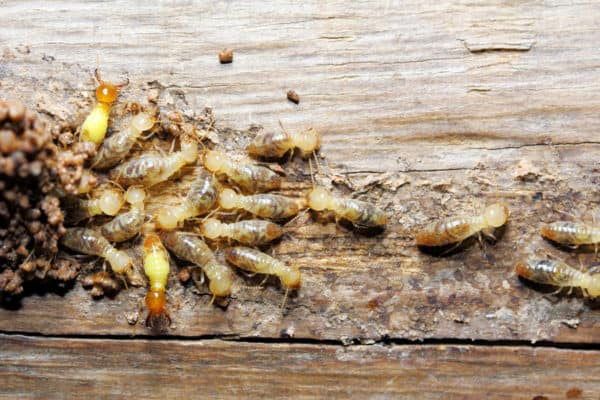READY TO GET STARTED?
REQUEST A FREE ESTIMATE
Fill out the form below or call (888) 466-7849 for a free, no-obligation estimate.

Termites can wreak havoc on a home without the homeowner even realizing it. By the time their presence is realized, the damage is extensive and costly. Termite colonies don’t just consist of hundreds of termites – they number in the millions! Termites can invade any type of home whether it is brick, stucco, wood, or other material. Termites will eat any material that contains cellulose, not just wood. These materials include cellulose insulation, framing timbers, and even drywall. An annual termite inspection can help prevent these devastating infestations by catching and eradicating them early, preventing significant damage and saving money in treatment and repair costs.
Termite inspections will typically begin with the inspector examining all possible points of entry to the home looking for common signs of termites. These signs include mud shelter tubes (pencil sized tubes termites use to travel), piles of frass (termite excrement), termite mazes on walls, discarded wings, etc. The inspector will also use a tool to gently tap on the interior and exterior walls of the home listening for hollow-sounding wood which in another sign of termite damage. The inspector will then check the exterior of the home, including crawlspaces, to check for wood to soil contact which is the easiest way for termites to gain access to a home. Wood to soil contact could be a stack of firewood that is too close to the home or deck posts not set in concrete. The inspector will also check trees, stumps, wooden retaining walls, fences, sheds, detached garages, and any other structures on the property. They will then notify you of their findings and recommend termite treatment options.
The best way to protect your home from termites is with a termite bond. This is a termite warranty between the termite company and the homeowner that is similar to a maintenance contract. They are usually made up of two components: an agreement for termite inspections during the lifetime of the bond and an agreement to provide termite control and treatment if termites are discovered. Bonds are especially important in real estate transactions. Most lenders will at a minimum require a termite inspection. Securing a termite bond provides you with a level of termite protection that can help you qualify for loans and also improve the marketability of your home.
If you suspect you have termites in your home or just want to be proactive in making sure these pests don’t invade your property, contact a professional termite control company and set up your annual termite inspection to give you peace of mind.
Categories